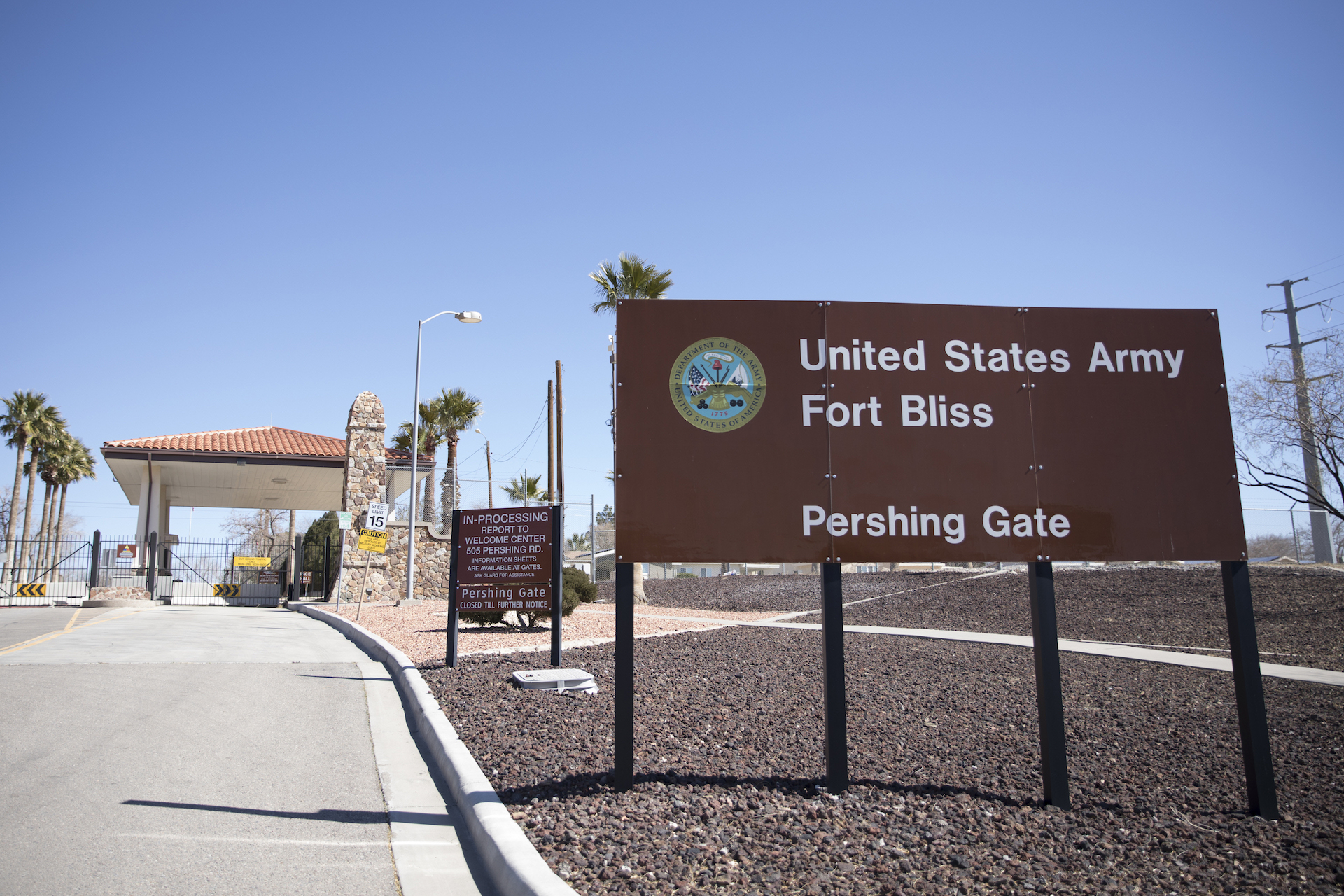Migrant Kids Face Danger, Trauma, and Separation at ‘Hellhole’ Border Tent Camp
Last spring, Kaitlin Hess paused her day job as a scientist at the Environmental Protection Agency to answer the Biden administration’s call for volunteers at the border, where thousands of migrant children were arriving unaccompanied, without adult relatives to care for them.
Hess, a 34-year-old who normally helps clean up hazardous waste sites, was deployed to Fort Bliss, a military base in the desert outside of El Paso where the kids were packed into massive white tents, hastily erected at a cost of more than $600 million by a disaster relief contractor. Hess was assigned to help get the kids processed into the immigration system and united with family members or sponsors in the U.S., but almost immediately she sensed trouble.
“This feels like a prison,” Hess told VICE News she recalled thinking. “That was after a week of being there, I was just like, ‘This is absolutely not right.’”
She saw kids crying and depressed, stuck in the tent city for weeks on end, lost in the system that was supposed to find them safe homes. Hess says children got separated from their relatives amid the confusion, including twin brothers who were split up, with one placed on a bus headed off the military base and the other left behind. The twins were eventually reunited, Hess said, but she and her fellow volunteers were taken aback by the grim conditions at Fort Bliss.
“Everyone around me, all of us, we were all just kind of like, ‘What is this place?’” Hess said. “This is not a place for children. This is not a place for adults. It was way worse than I could have imagined.”
A year later, Hess and five other federal whistleblowers are concerned little has changed at Fort Bliss and other “Emergency Intake Sites” created by the Department of Health and Human Services (HHS) to care for migrant children in early 2021. The Government Accountability Project, a group that represents the whistleblowers, sent a letter warning members of Congress on Tuesday that the Biden administration has failed to address dangerous and chaotic conditions in the facilities, raising alarms ahead of an expected migration surge in the coming weeks.
The letter—first obtained and reported by VICE News—was sent to several House and Senate committees and the HHS Office of Inspector General, describes “gross mismanagement, chaos, and substandard conditions” at the shelters. The letter builds on previous disclosures, and includes Hess identifying herself publicly as a whistleblower for the first time. It’s a risk she described as necessary because the Fort Bliss tent city is still operating under “emergency” status and warehousing hundreds of children, with more expected to start arriving soon and no indication that conditions have improved.
“There's absolutely been no transparency or nothing even done for that matter to try and change this process and make this better,” Hess said. “It's just a failure on many, many levels.”

The letter follows the White House’s decision to end Title 42, a policy first implemented during the Trump era to turn away virtually all asylum seekers at the border on public health grounds during the pandemic. The rollback of Title 42 has federal officials bracing for more people to arrive and test the new rules. Spring also brings seasonal migration that the letter warned could “overwhelm HHS—potentially causing chaos and harming still more children.”
An internal email obtained by VICE News shows that the Department of Health and Human Services is once again preparing for federal staffers to accept temporary deployments to the border to help care for a wave of unaccompanied children. The email, dated March 17, outlines the creation of an “Employee Detailee Program Management” to coordinate deployments ranging from 30-100 days for “urgent missions,” including working with Afghan refugees and unaccompanied minors.
The email says the Office of Refugee Resettlement “provides a safe environment to children who enter the United States without immigration status and without a parent or legal guardian to provide for their physical and mental wellbeing. While in ORR care, a child receives food, clothing, a warm bed, an education, and recreational time.”
A spokesperson for HHS did not immediately respond to a request for comment.
Those with firsthand experience have painted a bleak picture of Fort Bliss, an Army garrison where temperatures can swing from sweltering hot in the day to freezing cold at night, with dust storms that blow sand into the flimsy tents. Leecia Welch, a lawyer who was part of a team that visited last year and interviewed several kids, called it a “hellhole,” where she found 900 boys crammed into a single tent, many in dirty clothes and smelling like they hadn’t showered.
Welch, deputy litigation director at the legal advocacy group Children's Rights, said “a huge number of children we spoke to were crying, distraught, and anxious.”
“In my opinion, Fort Bliss is not suitable even for short-term emergency care of children,” Welch said. “Despite improvements, it will never be OK to force hundreds, if not thousands, of traumatized children to live in soft-sided tents on a military base.”
More than 122,000 unaccompanied children, who mostly come from Central America, were processed by U.S. border agents and handed off to HHS’ Office of Refugee Resettlement in the 2021 fiscal year, which ended last September. Responding to the influx, the Biden administration set up a network of emergency shelters in convention centers, warehouses, and other stopgaps like Fort Bliss. The facilities, intended as a temporary and more humane alternative to Border Patrol holding cells, have since been plagued by reports of mismanagement and dangerous conditions.
The whistleblowers represented by the Government Accountability Project are all career federal employees detailed to Fort Bliss between April and July of 2021. Hess still works at the EPA and she said nearly every federal agency was represented at Fort Bliss, including NASA.

The letter to Congress listed the whistleblowers’ allegations as bullet points, including:
• “Children held for weeks without basic needs such as clean underwear or bedding…”
• “Contractors with no experience or expertise in childcare regularly threatening children with deportation”
• “An unsafe environment for children including harmful noise levels, 24-hour lighting in sleeping areas, and sleeping arrangements that impeded supervision”
• “A culture of secrecy lacking any method to address numerous concerns in which bullying, rioting, and sexual harassment of children went unaddressed”
Dana Gold, senior counsel at the Government Accountability Project, said in a statement to VICE News that it took “horrific, chaotic conditions” for multiple federal employees to speak out.
“Children were lost in faulty case management systems, contractors who had no experience working with children managed the operation, and children were held for months without their basic needs met in giant tents,” Gold said. “Our clients along with other federal workers are being asked to again volunteer to help HHS fulfill its duty to protect unaccompanied children, yet HHS has made no assurances that conditions have improved.”
More than 10,300 migrant children were in HHS custody as of April 4, with hundreds more coming into the system each day after crossing the border and hundreds of others leaving after being placed with relatives or sponsors across the United States, where they remain while their cases are resolved in court.
Hess says one of the biggest issues she encountered at Fort Bliss was kids not being promptly seen and tracked by case managers, who are supposed to monitor their status and ensure the vetting and placement process goes smoothly. Hess was assigned to escort kids from the tent where they slept to a tent where the case managers worked. She spoke little Spanish and mostly communicated using Google Translate on her phone, which tracked her walking over 400 miles in two months as she trekked across the sprawling compound. Hess says some case managers, which included many contractors, were seeing as few as three children per day.
“They were just producing very, very low numbers and there wasn't any push for them to try and work harder,” she said. “There were several kids who looked like they were in complete distress and crying and just not in a good state that went to the mental health tent after being seen with the case manager.”
Hess began taking notes on her phone, and eventually learned that the case managers were losing track of kids. Some slipped through the cracks and went weeks without a check-in, or worse, ended up being temporarily split up from a relative.
“We would notice that kids were marked as they had left the facility and they were still there,” Hess said. “We would catch siblings in the system who had gotten separated or who were about to get separated, or cousins. Every day it was a new thing.”
The average length of stay for unaccompanied children in federal custody fell from 102 days in 2020 to 37 last year, according to the Office of Refugee Resettlement, perhaps a sign that the case management system has improved, but there’s evidence that even short stays in the emergency intake shelters could be further traumatizing for young people who have often fled violence and endured the difficult journey to the border alone.
Earlier whistleblower complaints described cases of medical neglect, with sick kids failing to promptly receive care, including a young girl with “profuse vaginal bleeding.” The whistleblower reported not being allowed to immediately escort the girl out of the tent for medical attention, with help coming only after a dispute over the situation escalated up the chain of command.
Leaked audio recordings obtained last year by the publication Reason reportedly captured the person running a training session for federal employees saying kids were “dropping like flies” at Fort Bliss, and speaking candidly about the conditions in the tents.
“They're filthy,” the trainer was recorded saying. “They're dirty. There's food on the floor. There's wet spots all over the place. The beds are dirty. I don't know what's going on or who's responsible for ensuring that the dorms need to be clean, but we all need to be responsible for telling the minors to clean up after themselves."
Hess said she “had some crazy PTSD” after completing her assignment at Fort Bliss, and she would never consider volunteering at the border again. She still recalls how dark the situation became as kids who’d been stuck in the tents for weeks realized that not everyone who was allowed to leave was being reunited with relatives—some were being transferred to other facilities, where they would continue to be detained indefinitely.
“The tent would erupt in a clapping thing and the children wouldn't even flinch because they knew that they weren't going to a family member or sponsor,” Hess said. “Oftentimes we'd see kids crying as they were leaving. We got instructions back and forth that we should continue to clap. I just stopped. At one point I was just like, I can't keep doing this. This just seems so insane.”
#DmtDailyNews
via https://www.DMT.NEWS
Keegan Hamilton, Khareem Sudlow
